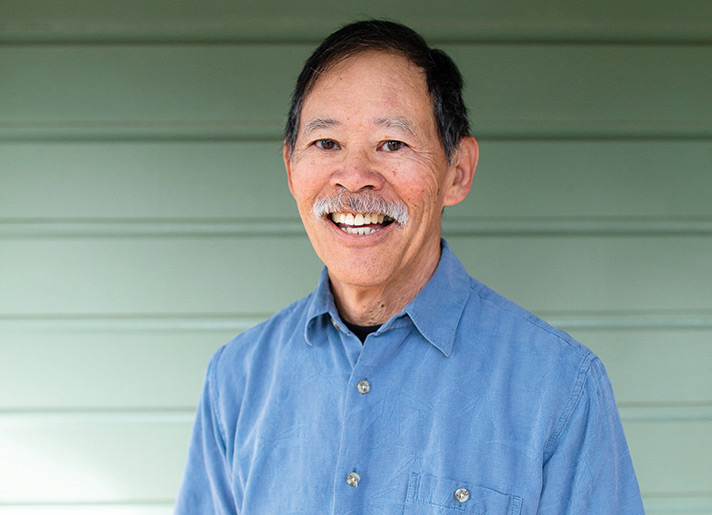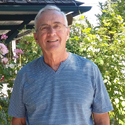Sensational Seniors – December 2019/January 2020
“When I was a kid, I just wanted to play baseball, but I kept getting blamed for Pearl Harbor… and this was the climate I grew up in.” This quote from Jacksonville resident, Dave Doi, struck me as particularly poignant given the racial divide that our country still struggles with to this day. As the “Sensational Senior” subject of this issue of the Jacksonville Review, Dave’s personal and professional life is a rich story.
Dave was born on April 5, 1947 in Monterey, California, at the Fort Ord Military Base. The story surrounding his birth is an intriguing one, requiring some background explanation. Both of Dave’s parents were born in the Seattle area in 1916 after their parents immigrated from Japan to the United States around the turn of the century. A Japanese custom at that time was that second-generation Japanese children (Nisei) would be sent to Japan for a period of time to experience the Japanese culture. This is what happened to Dave’s mother, Peggie Osasa, but, while Peggie and her parents were in Japan, her mother had another baby, Kenwo. Rather than risk a long boat ride back to the U.S., Kenwo remained in Japan with his mother while Peggie returned to America with her father. For some reason, upon their return to America, Peggie’s father never filled out the required paperwork to register Kenwo as an American citizen. With recently passed anti-immigration laws, Kenwo was never allowed to enter the U.S. Dave only saw his uncle once and his mother only saw him a couple times before his death.
Returning to the Seattle area, Dave’s mother attended a business school which led to her securing a good job with a farm produce buyer. Dave remembers his mother telling him, “This was a dream job for me. I made $500 a month and was able to purchase a new car every year.” His mother met his dad, Bill Doi, while buying produce from the Doi family farm. Dave smiles when remembering the story of their early courtship. “My dad thought my eventual mom was pretty nice looking and asked his brother about her only to be told that ‘she doesn’t date Japanese’ on the mistaken assumption that, since she worked for a Caucasian buyer, she would not be interested in him”
His parents’ lives were dramatically changed with the outbreak of WW II on the heels of the bombing of Pearl Harbor, which opened an ugly chapter in American history. In 1942, both of Dave’s parents were sent to the internment camp in Tule Lake, California, called the “Tule Lake Relocation Center.” Dave’s mother was selected to work the internment camp registration desk and once again connected with his father when she registered him. This began a courtship that eventually ended in marriage in June 1943. Dave’s father’s stay at Tule Lake was shortened when he agreed to participate in a U.S Army program to recruit young Japanese men to help in the WWII Pacific campaign. Specifically, they wanted recruits who had Japanese language skills. Dave’s dad took a language test, passed it and in late 1942 became a U.S. Army soldier and was sent to a Military Intelligence Service Language School just south of Minneapolis, Minnesota. His dad received much criticism from people in the internment camp who felt they had been betrayed by the US government, but Dave’s dad professed, “I was born in America, raised in America, am loyal to America and I’m willing to fight for America.” A few months later, Bill Doi proposed to Peggie, still interned at Tule Lake, by sending her a stuffed bunny with an engagement ring attached. Peggie was so excited that she immediately telegrammed her acceptance. Health issues kept his father from going to the South Pacific, but he became a sergeant and was sent to Fort Ord where Dave was born.
When the war ended and his father completed his military obligation, the young family returned to Minneapolis and settled into civilian life, but the Japanese stigma was still with them and as Dave recalls, “Things were going fine until my parents decided to purchase a home. The neighbors heard of this and sent a petition around against them moving into the neighborhood but, my mother who had converted to Catholicism, got the priest to help them and their Realtor stepped forward to thwart this unmistakable racism.” Dave’s parents wished to instill some aspect of Japanese culture in Dave and his three sisters and brother, but Dave resisted, noting, “I didn’t like being Japanese. I refused to eat rice, use chopsticks or learn any Japanese, and I resisted going to any Japanese cultural activities.” Dave attended Catholic grade and high schools in Minneapolis, graduating from De La Salle High School in 1965 before enrolling at the University of Minnesota. Ironically, he did not receive his college degree until 1992.
While in college, following his father’s activism for civil rights for all people of color, Dave became a student organizer protesting the Vietnam War. The result of these extra-curricular college activities was that Dave decided he would make community organizing a career. In the early 1970’s he attended a training institute in Chicago which led to various community organizing positions in the Twin Cities and eventually he started working for the city of Minneapolis to develop a Neighborhood Watch program. His success with this initial work resulted in him being named the Executive Director of the Minneapolis Community Crime Prevention Program where he worked closely with the Minneapolis Police Department, helping them establish closer relationships with crime-ridden neighborhoods. This effort brought about a lower crime rate for the city and gave Dave some national exposure. In 1983, Dave was asked to join the National Alliance Against Violence (NAAV), an organization founded by the owner of Rolling Stone magazine after the death of John Lennon. Dave’s effective work with the Minneapolis PD was just what they were looking for as his job was to work with large city police departments across the United States with a focus on gun safety and explicitly on keeping guns out of the hands of children. In 1985, the NAAV merged with the Brady Campaign to Prevent Gun Violence, and Dave transferred to Washington D.C. with the task of starting a national department of law enforcement relations program. Dave relates, “My job was basically to develop relationships with police chiefs, sheriffs and rank and file public safety leaders across the country.”
After ten years in this job, Dave was hired as the Executive Director of the Coalition for Juvenile Justice (CJJ). He was to spend another ten years in this position before retiring. While his main function was to serve in an advisory capacity to states on how to spend juvenile justice dollars, he is most proud of two significant achievements during his time with CJJ. One of the organization’s goals was to lobby states to not execute youth who were under 18. A Georgia youth who had done a heinous crime when he was 17 had been on death row until he was 33. Less than 36 hours before he was scheduled to die by lethal injection, Dave, representing the CJJ, testified before the Georgia State Board of Pardons and Paroles and a five-day stay of execution was granted. During that five days a thorough mental evaluation was finally completed, and it was determined that the man was and had been severely schizophrenic since his youth and should be sentenced to life in prison without parole… and this was the result.
The other aspect of his work with CJJ that Dave takes pride in was helping file a brief for a 2005 US Supreme Court case to disallow the execution of a juvenile under the age of 18. The 5-4 vote to overturn the juvenile death penalty was a major win for Dave and CJJ.
Dave met his wife, Sue Miler, at the Newman Center on their college campus, but, while friends, they ended up marrying other people only to re-connect after they both divorced and then married in 1976. Sue brought a daughter to the family, and their son was born in 1984. Sue had a demanding job with the AARP Foundation, running all their programs for low income seniors, but, when Dave retired in 2006, Sue took a four-week sabbatical and they started exploring the west coast as a potential place to retire. Their daughter was in Los Angeles and their son was enjoying being a “ski bum” in Colorado, Utah and Wyoming, and they knew they wanted to be closer to them. Their exploratory travels led them to Oregon, starting in Portland, but the annual rainfall was a deterrent. They especially liked the feel of a stopover in Ashland but made no decision about re-locating until 2009 when Sue retired, when they sold their home in DC and needed to find a new place to live. Sue made a fast trip back to Ashland, looking for a home to rent. A Realtor asked if she had considered Jacksonville, but while she had never heard of the town, she said she would look. The drive to Jacksonville on South Stage Road with the vineyards and orchards in vivid display convinced her that Jacksonville would be a good place to live. After searching for a home to rent for twelve days, she located one in Nunan Square which they initially rented and eventually purchased.
While it was a rather dramatic change from living in Washington DC to moving to the small village of Jacksonville, Dave maintains, “It was an easy transition. Jacksonville is a unique town, and I was amazed that our next-door neighbor, Grace Emori, was one of only a few other Japanese residents in Jacksonville.” Grace introduced Sue to the Jacksonville Garden Club and then both Dave and Sue to the Jacksonville Community Center organization at its pivotal time of fundraising and building the new facility. Sue became the Community Center grant writer and today Sue serves as President of the Board of Directors and Dave acts as Secretary for the Board.
Dave and Sue are avid travelers and especially enjoy visiting their daughter and two grandchildren in Los Angeles and following their son, who plays professional ultimate frisbee, all over the world. Dave and Sue are another Jacksonville couple who have come to our town after enjoying intriguing professional careers but still wish to give back to their new community.

 Mike McClain spent 32 years as a teacher and school administrator, retiring in 1999 as Superintendent of Central Point Schools. He and his wife relocated to Jacksonville four years ago and are enjoying immersing themselves in this unique community.
Mike McClain spent 32 years as a teacher and school administrator, retiring in 1999 as Superintendent of Central Point Schools. He and his wife relocated to Jacksonville four years ago and are enjoying immersing themselves in this unique community.